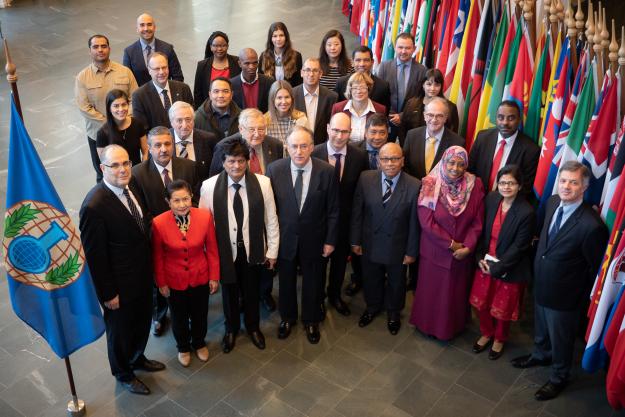
Participants at the workshop on “Green and Sustainable Chemistry: Fostering Safety and Security through Innovation”
THE HAGUE, Netherlands — 6 December 2018 — Scientists and chemistry professionals gathered for the workshop, “Green and Sustainable Chemistry: Fostering Safety and Security through Innovation” with the aim of strengthening international security through innovation and science, at the Headquarters of the Organisation for the Prohibition of Chemical Weapons (OPCW) in The Hague, from 4 to 5 December.
Opening the event, OPCW’s Director-General, H.E. Mr Fernando Arias, noted the importance for the Organisation to assist its Member States to enhance the chemical safety and security of their national chemical industries. The Director-General underlined that such activities are crucial to ensure that chemistry is not used for harm and is used solely for peaceful purposes.
“For decades, it has been the quest of many to find safer alternatives and more sustainable processes to mitigate the risks associated with toxic chemicals. Science, industry and civil society have all been motivated by the same goal: sustainable, safe, and secure chemistry for the economic and social well-being of populations”, declared the Director-General.
The meeting gathered 20 professionals including scientists, technologists, and members of professional chemical societies and associations.
The participants presented lectures on a range of topics, including: academic research and industry applications of green and sustainable chemistry; activities of international organisations in the promotion of green and sustainable chemistry; efforts in education; assessment of the sustainability of chemical processes; and regional and national reports on the implementation of green and sustainable chemistry solutions.
The meeting stimulated discussion about cooperation opportunities among the various stakeholders, and the ways that the OPCW can best support its Member States to develop sustainable chemical industry.
The participants represented the following OPCW Member States: Algeria, Bangladesh, Belgium, Brazil, Ecuador, France, Germany, India, Indonesia, Iraq, Italy, Malaysia, Paraguay, the Philippines, Russia, South Africa, Sudan, and Thailand.
This workshop and other activities within the Green and Sustainable Chemistry initiative are implemented in coordination with two OPCW’s strategic partners, the International Council of Chemical Associations (ICCA) and the International Union for Pure and Applied Chemistry (IUPAC).
Background
OPCW’s Initiative on Green and Sustainable Chemistry was launched in 2016 to enhance the implementation of Article XI of the Chemical Weapons Convention that concerns the economic and technological development of OPCW Member States, and international cooperation in the field of chemical activities.
The initiative serves as a platform for OPCW Member States to share knowledge of developments in green and sustainable chemistry, and to stimulate cooperation among stakeholders.
By supporting Green and Sustainable Chemistry, the OPCW seeks to sensitise stakeholders about possible alternatives to toxic chemicals. The Organisation also works to facilitate stakeholder partnerships to ensure a safer and more secure and sustainable chemistry through education, research, innovation and implementation of best practices.
As the implementing body for the Chemical Weapons Convention, the OPCW, with its 193 Member States, oversees the global endeavour to permanently eliminate chemical weapons. Since the Convention’s entry into force in 1997, it is the most successful disarmament treaty eliminating an entire class of weapons of mass destruction.
Over 96% of all chemical weapon stockpiles declared by possessor States have been destroyed under OPCW verification. For its extensive efforts in eliminating chemical weapons, the OPCW received the 2013 Nobel Peace Prize.
More Information
- Article XI Capacity Building Programmes – Economic and Technological Development though Chemistry
- OPCW Green Chemistry Workshop, November 2017
- OPCW Workshop on Chemistry for Safety, Security and Environmental Safeguards, January 2017
- OPCW Inaugural Expert Group Meeting on Green Chemistry, April 2016
- OPCW Fact Sheets
